The Impact of Social Media on Mental Health: A Comprehensive Review
VerifiedAdded on 2021/04/24
|12
|3484
|769
Report
AI Summary
This report examines the multifaceted effects of social media on mental health, drawing on various studies and research findings. It begins by defining social media and mental health, highlighting the prevalence of platforms like Facebook, Twitter, and Instagram in modern life. The report then delves into research on internet addiction, exploring studies by Kimberly S. Young and others, which identify problematic behaviors and psychological impacts associated with excessive internet use. It further investigates the relationship between social media and depression, examining how online interactions can influence mood and well-being. The report also analyzes studies on personality traits and online behavior, such as the impact of extraversion and introversion on internet interactions, and how social media use can lead to issues like jealousy and low self-esteem, particularly in romantic relationships. Additionally, the report covers the influence of parental behaviors on internet addiction and the association between excessive internet usage and psychological distress. The research reviewed underscores the complex and often negative effects of social media on mental health, emphasizing the need for awareness and strategies to promote healthy digital habits.
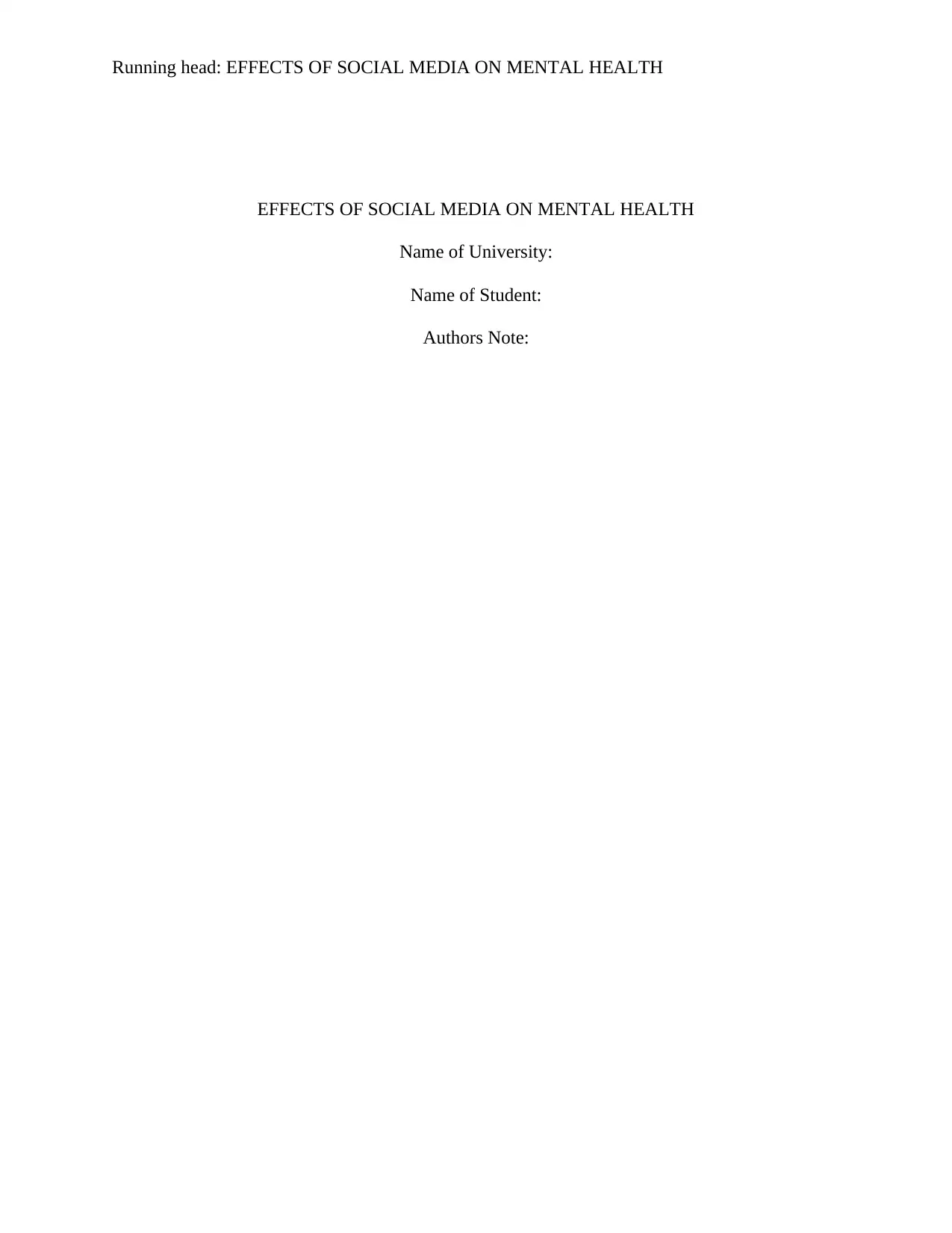
Running head: EFFECTS OF SOCIAL MEDIA ON MENTAL HEALTH
EFFECTS OF SOCIAL MEDIA ON MENTAL HEALTH
Name of University:
Name of Student:
Authors Note:
EFFECTS OF SOCIAL MEDIA ON MENTAL HEALTH
Name of University:
Name of Student:
Authors Note:
Paraphrase This Document
Need a fresh take? Get an instant paraphrase of this document with our AI Paraphraser
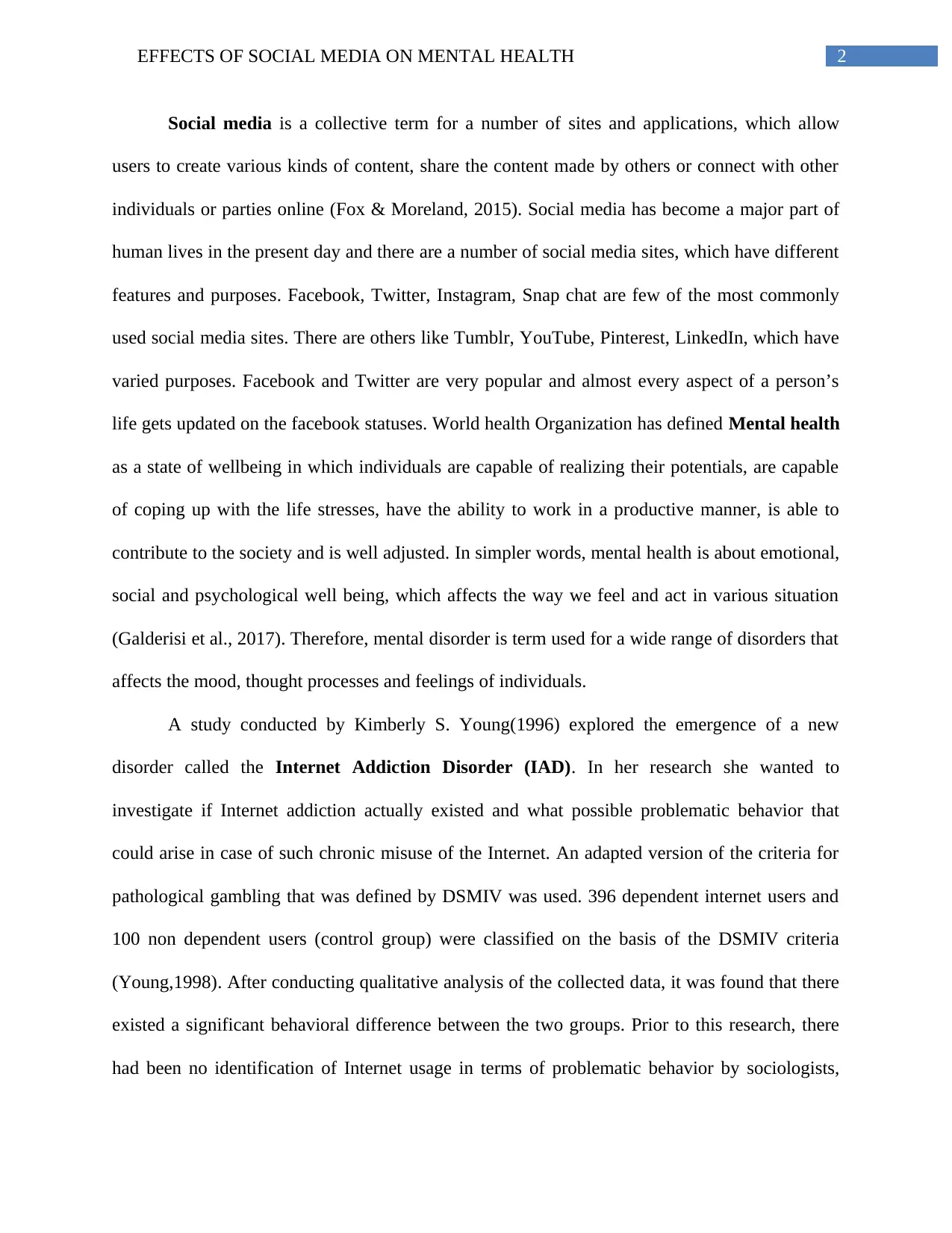
2EFFECTS OF SOCIAL MEDIA ON MENTAL HEALTH
Social media is a collective term for a number of sites and applications, which allow
users to create various kinds of content, share the content made by others or connect with other
individuals or parties online (Fox & Moreland, 2015). Social media has become a major part of
human lives in the present day and there are a number of social media sites, which have different
features and purposes. Facebook, Twitter, Instagram, Snap chat are few of the most commonly
used social media sites. There are others like Tumblr, YouTube, Pinterest, LinkedIn, which have
varied purposes. Facebook and Twitter are very popular and almost every aspect of a person’s
life gets updated on the facebook statuses. World health Organization has defined Mental health
as a state of wellbeing in which individuals are capable of realizing their potentials, are capable
of coping up with the life stresses, have the ability to work in a productive manner, is able to
contribute to the society and is well adjusted. In simpler words, mental health is about emotional,
social and psychological well being, which affects the way we feel and act in various situation
(Galderisi et al., 2017). Therefore, mental disorder is term used for a wide range of disorders that
affects the mood, thought processes and feelings of individuals.
A study conducted by Kimberly S. Young(1996) explored the emergence of a new
disorder called the Internet Addiction Disorder (IAD). In her research she wanted to
investigate if Internet addiction actually existed and what possible problematic behavior that
could arise in case of such chronic misuse of the Internet. An adapted version of the criteria for
pathological gambling that was defined by DSMIV was used. 396 dependent internet users and
100 non dependent users (control group) were classified on the basis of the DSMIV criteria
(Young,1998). After conducting qualitative analysis of the collected data, it was found that there
existed a significant behavioral difference between the two groups. Prior to this research, there
had been no identification of Internet usage in terms of problematic behavior by sociologists,
Social media is a collective term for a number of sites and applications, which allow
users to create various kinds of content, share the content made by others or connect with other
individuals or parties online (Fox & Moreland, 2015). Social media has become a major part of
human lives in the present day and there are a number of social media sites, which have different
features and purposes. Facebook, Twitter, Instagram, Snap chat are few of the most commonly
used social media sites. There are others like Tumblr, YouTube, Pinterest, LinkedIn, which have
varied purposes. Facebook and Twitter are very popular and almost every aspect of a person’s
life gets updated on the facebook statuses. World health Organization has defined Mental health
as a state of wellbeing in which individuals are capable of realizing their potentials, are capable
of coping up with the life stresses, have the ability to work in a productive manner, is able to
contribute to the society and is well adjusted. In simpler words, mental health is about emotional,
social and psychological well being, which affects the way we feel and act in various situation
(Galderisi et al., 2017). Therefore, mental disorder is term used for a wide range of disorders that
affects the mood, thought processes and feelings of individuals.
A study conducted by Kimberly S. Young(1996) explored the emergence of a new
disorder called the Internet Addiction Disorder (IAD). In her research she wanted to
investigate if Internet addiction actually existed and what possible problematic behavior that
could arise in case of such chronic misuse of the Internet. An adapted version of the criteria for
pathological gambling that was defined by DSMIV was used. 396 dependent internet users and
100 non dependent users (control group) were classified on the basis of the DSMIV criteria
(Young,1998). After conducting qualitative analysis of the collected data, it was found that there
existed a significant behavioral difference between the two groups. Prior to this research, there
had been no identification of Internet usage in terms of problematic behavior by sociologists,
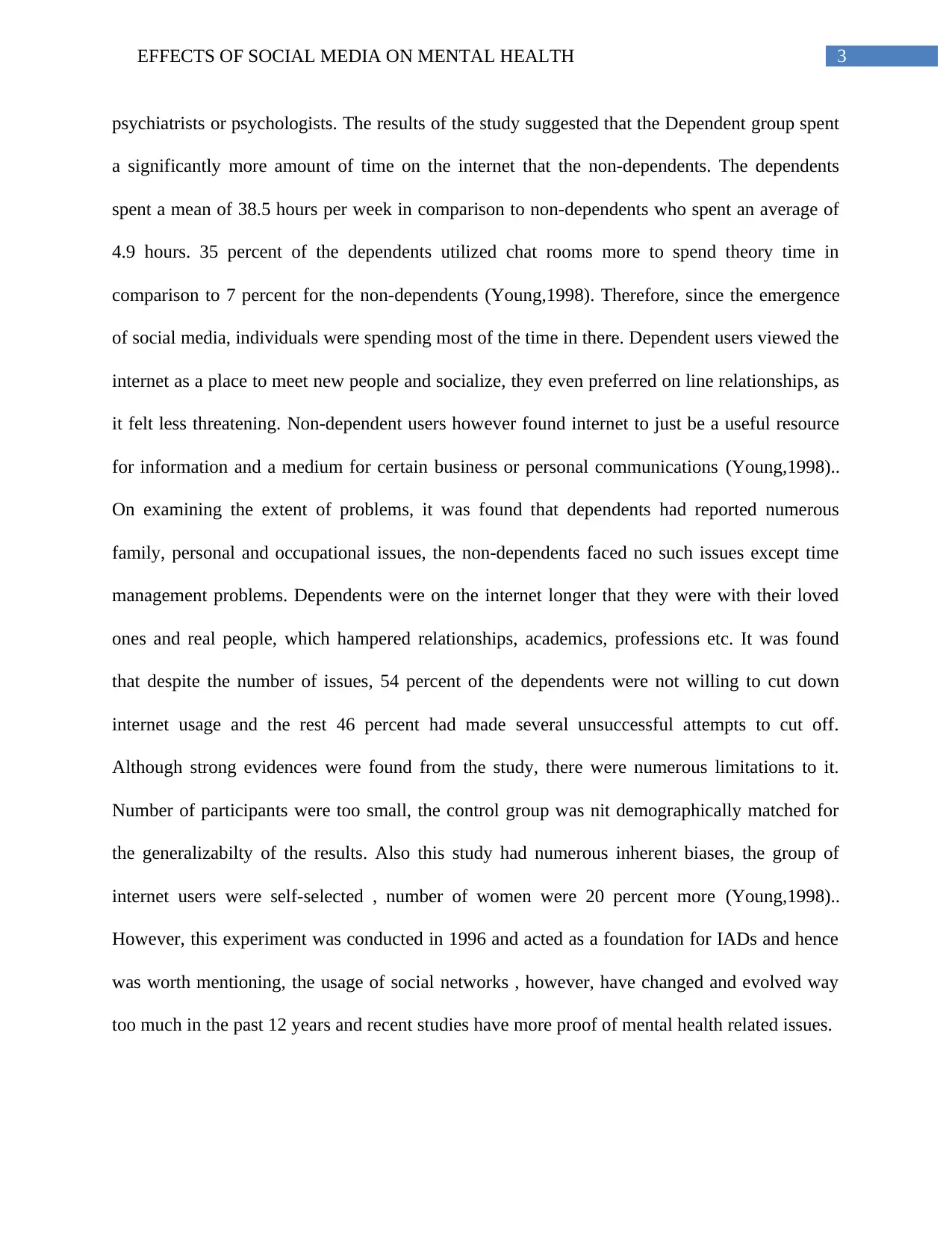
3EFFECTS OF SOCIAL MEDIA ON MENTAL HEALTH
psychiatrists or psychologists. The results of the study suggested that the Dependent group spent
a significantly more amount of time on the internet that the non-dependents. The dependents
spent a mean of 38.5 hours per week in comparison to non-dependents who spent an average of
4.9 hours. 35 percent of the dependents utilized chat rooms more to spend theory time in
comparison to 7 percent for the non-dependents (Young,1998). Therefore, since the emergence
of social media, individuals were spending most of the time in there. Dependent users viewed the
internet as a place to meet new people and socialize, they even preferred on line relationships, as
it felt less threatening. Non-dependent users however found internet to just be a useful resource
for information and a medium for certain business or personal communications (Young,1998)..
On examining the extent of problems, it was found that dependents had reported numerous
family, personal and occupational issues, the non-dependents faced no such issues except time
management problems. Dependents were on the internet longer that they were with their loved
ones and real people, which hampered relationships, academics, professions etc. It was found
that despite the number of issues, 54 percent of the dependents were not willing to cut down
internet usage and the rest 46 percent had made several unsuccessful attempts to cut off.
Although strong evidences were found from the study, there were numerous limitations to it.
Number of participants were too small, the control group was nit demographically matched for
the generalizabilty of the results. Also this study had numerous inherent biases, the group of
internet users were self-selected , number of women were 20 percent more (Young,1998)..
However, this experiment was conducted in 1996 and acted as a foundation for IADs and hence
was worth mentioning, the usage of social networks , however, have changed and evolved way
too much in the past 12 years and recent studies have more proof of mental health related issues.
psychiatrists or psychologists. The results of the study suggested that the Dependent group spent
a significantly more amount of time on the internet that the non-dependents. The dependents
spent a mean of 38.5 hours per week in comparison to non-dependents who spent an average of
4.9 hours. 35 percent of the dependents utilized chat rooms more to spend theory time in
comparison to 7 percent for the non-dependents (Young,1998). Therefore, since the emergence
of social media, individuals were spending most of the time in there. Dependent users viewed the
internet as a place to meet new people and socialize, they even preferred on line relationships, as
it felt less threatening. Non-dependent users however found internet to just be a useful resource
for information and a medium for certain business or personal communications (Young,1998)..
On examining the extent of problems, it was found that dependents had reported numerous
family, personal and occupational issues, the non-dependents faced no such issues except time
management problems. Dependents were on the internet longer that they were with their loved
ones and real people, which hampered relationships, academics, professions etc. It was found
that despite the number of issues, 54 percent of the dependents were not willing to cut down
internet usage and the rest 46 percent had made several unsuccessful attempts to cut off.
Although strong evidences were found from the study, there were numerous limitations to it.
Number of participants were too small, the control group was nit demographically matched for
the generalizabilty of the results. Also this study had numerous inherent biases, the group of
internet users were self-selected , number of women were 20 percent more (Young,1998)..
However, this experiment was conducted in 1996 and acted as a foundation for IADs and hence
was worth mentioning, the usage of social networks , however, have changed and evolved way
too much in the past 12 years and recent studies have more proof of mental health related issues.
⊘ This is a preview!⊘
Do you want full access?
Subscribe today to unlock all pages.

Trusted by 1+ million students worldwide
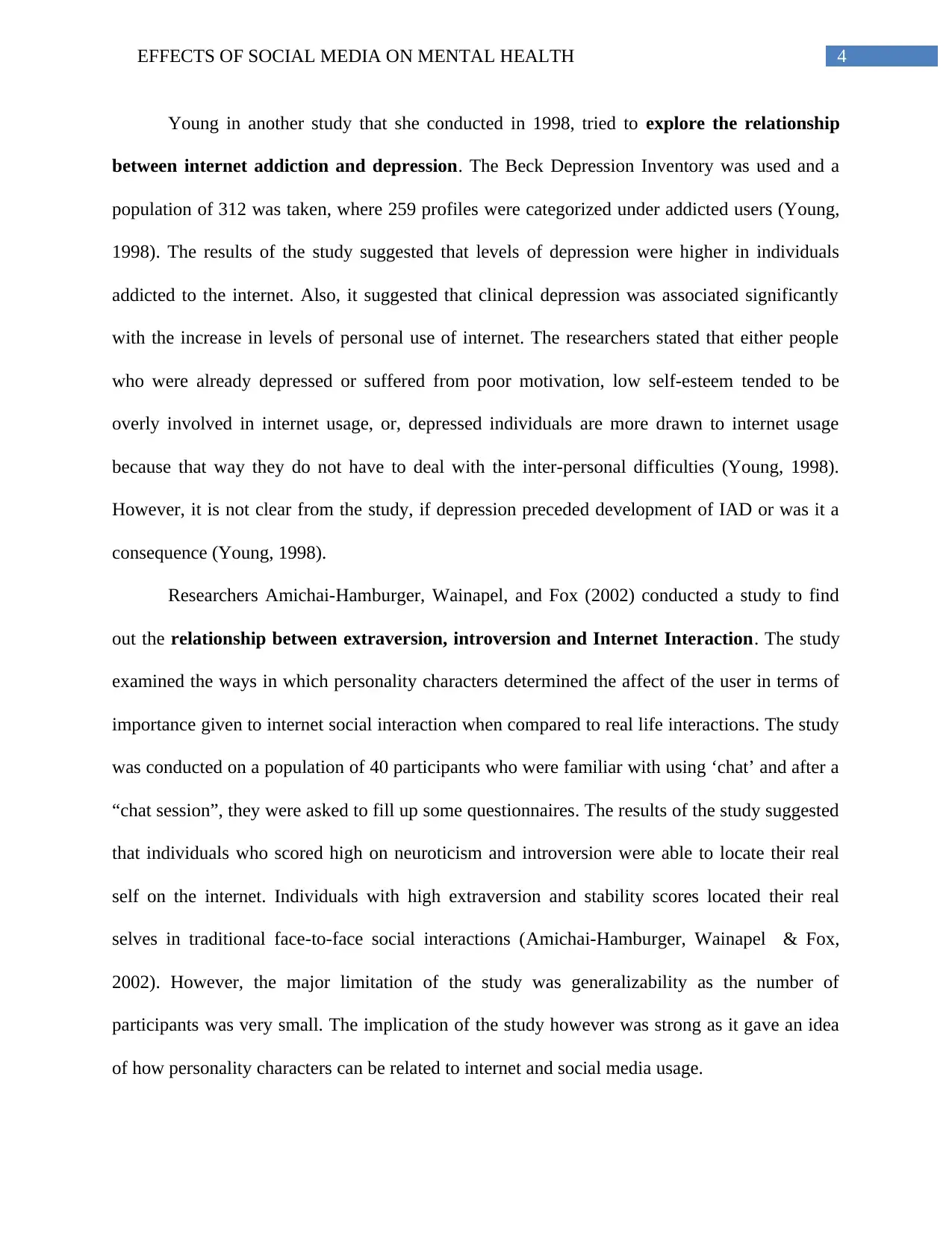
4EFFECTS OF SOCIAL MEDIA ON MENTAL HEALTH
Young in another study that she conducted in 1998, tried to explore the relationship
between internet addiction and depression. The Beck Depression Inventory was used and a
population of 312 was taken, where 259 profiles were categorized under addicted users (Young,
1998). The results of the study suggested that levels of depression were higher in individuals
addicted to the internet. Also, it suggested that clinical depression was associated significantly
with the increase in levels of personal use of internet. The researchers stated that either people
who were already depressed or suffered from poor motivation, low self-esteem tended to be
overly involved in internet usage, or, depressed individuals are more drawn to internet usage
because that way they do not have to deal with the inter-personal difficulties (Young, 1998).
However, it is not clear from the study, if depression preceded development of IAD or was it a
consequence (Young, 1998).
Researchers Amichai-Hamburger, Wainapel, and Fox (2002) conducted a study to find
out the relationship between extraversion, introversion and Internet Interaction. The study
examined the ways in which personality characters determined the affect of the user in terms of
importance given to internet social interaction when compared to real life interactions. The study
was conducted on a population of 40 participants who were familiar with using ‘chat’ and after a
“chat session”, they were asked to fill up some questionnaires. The results of the study suggested
that individuals who scored high on neuroticism and introversion were able to locate their real
self on the internet. Individuals with high extraversion and stability scores located their real
selves in traditional face-to-face social interactions (Amichai-Hamburger, Wainapel & Fox,
2002). However, the major limitation of the study was generalizability as the number of
participants was very small. The implication of the study however was strong as it gave an idea
of how personality characters can be related to internet and social media usage.
Young in another study that she conducted in 1998, tried to explore the relationship
between internet addiction and depression. The Beck Depression Inventory was used and a
population of 312 was taken, where 259 profiles were categorized under addicted users (Young,
1998). The results of the study suggested that levels of depression were higher in individuals
addicted to the internet. Also, it suggested that clinical depression was associated significantly
with the increase in levels of personal use of internet. The researchers stated that either people
who were already depressed or suffered from poor motivation, low self-esteem tended to be
overly involved in internet usage, or, depressed individuals are more drawn to internet usage
because that way they do not have to deal with the inter-personal difficulties (Young, 1998).
However, it is not clear from the study, if depression preceded development of IAD or was it a
consequence (Young, 1998).
Researchers Amichai-Hamburger, Wainapel, and Fox (2002) conducted a study to find
out the relationship between extraversion, introversion and Internet Interaction. The study
examined the ways in which personality characters determined the affect of the user in terms of
importance given to internet social interaction when compared to real life interactions. The study
was conducted on a population of 40 participants who were familiar with using ‘chat’ and after a
“chat session”, they were asked to fill up some questionnaires. The results of the study suggested
that individuals who scored high on neuroticism and introversion were able to locate their real
self on the internet. Individuals with high extraversion and stability scores located their real
selves in traditional face-to-face social interactions (Amichai-Hamburger, Wainapel & Fox,
2002). However, the major limitation of the study was generalizability as the number of
participants was very small. The implication of the study however was strong as it gave an idea
of how personality characters can be related to internet and social media usage.
Paraphrase This Document
Need a fresh take? Get an instant paraphrase of this document with our AI Paraphraser
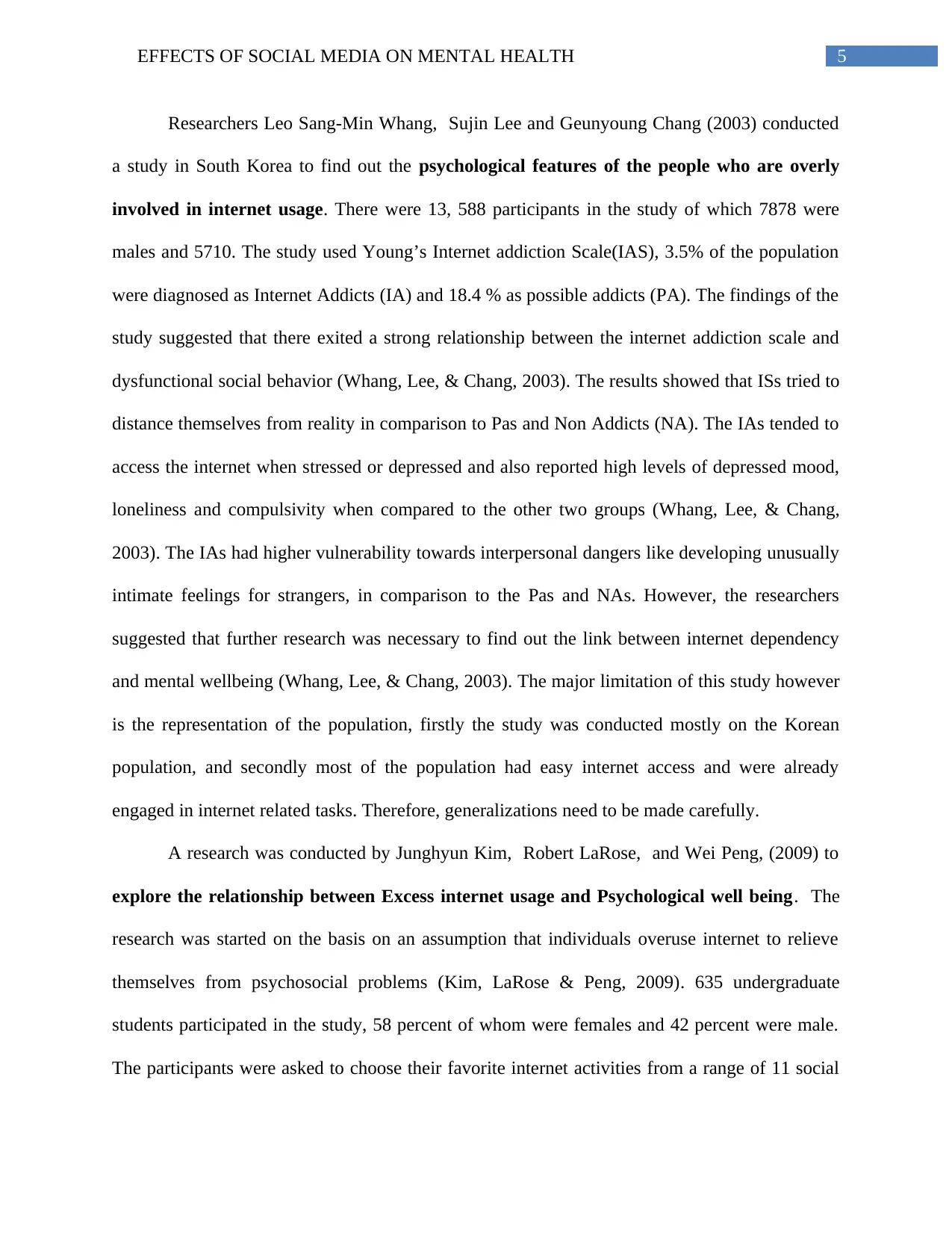
5EFFECTS OF SOCIAL MEDIA ON MENTAL HEALTH
Researchers Leo Sang-Min Whang, Sujin Lee and Geunyoung Chang (2003) conducted
a study in South Korea to find out the psychological features of the people who are overly
involved in internet usage. There were 13, 588 participants in the study of which 7878 were
males and 5710. The study used Young’s Internet addiction Scale(IAS), 3.5% of the population
were diagnosed as Internet Addicts (IA) and 18.4 % as possible addicts (PA). The findings of the
study suggested that there exited a strong relationship between the internet addiction scale and
dysfunctional social behavior (Whang, Lee, & Chang, 2003). The results showed that ISs tried to
distance themselves from reality in comparison to Pas and Non Addicts (NA). The IAs tended to
access the internet when stressed or depressed and also reported high levels of depressed mood,
loneliness and compulsivity when compared to the other two groups (Whang, Lee, & Chang,
2003). The IAs had higher vulnerability towards interpersonal dangers like developing unusually
intimate feelings for strangers, in comparison to the Pas and NAs. However, the researchers
suggested that further research was necessary to find out the link between internet dependency
and mental wellbeing (Whang, Lee, & Chang, 2003). The major limitation of this study however
is the representation of the population, firstly the study was conducted mostly on the Korean
population, and secondly most of the population had easy internet access and were already
engaged in internet related tasks. Therefore, generalizations need to be made carefully.
A research was conducted by Junghyun Kim, Robert LaRose, and Wei Peng, (2009) to
explore the relationship between Excess internet usage and Psychological well being. The
research was started on the basis on an assumption that individuals overuse internet to relieve
themselves from psychosocial problems (Kim, LaRose & Peng, 2009). 635 undergraduate
students participated in the study, 58 percent of whom were females and 42 percent were male.
The participants were asked to choose their favorite internet activities from a range of 11 social
Researchers Leo Sang-Min Whang, Sujin Lee and Geunyoung Chang (2003) conducted
a study in South Korea to find out the psychological features of the people who are overly
involved in internet usage. There were 13, 588 participants in the study of which 7878 were
males and 5710. The study used Young’s Internet addiction Scale(IAS), 3.5% of the population
were diagnosed as Internet Addicts (IA) and 18.4 % as possible addicts (PA). The findings of the
study suggested that there exited a strong relationship between the internet addiction scale and
dysfunctional social behavior (Whang, Lee, & Chang, 2003). The results showed that ISs tried to
distance themselves from reality in comparison to Pas and Non Addicts (NA). The IAs tended to
access the internet when stressed or depressed and also reported high levels of depressed mood,
loneliness and compulsivity when compared to the other two groups (Whang, Lee, & Chang,
2003). The IAs had higher vulnerability towards interpersonal dangers like developing unusually
intimate feelings for strangers, in comparison to the Pas and NAs. However, the researchers
suggested that further research was necessary to find out the link between internet dependency
and mental wellbeing (Whang, Lee, & Chang, 2003). The major limitation of this study however
is the representation of the population, firstly the study was conducted mostly on the Korean
population, and secondly most of the population had easy internet access and were already
engaged in internet related tasks. Therefore, generalizations need to be made carefully.
A research was conducted by Junghyun Kim, Robert LaRose, and Wei Peng, (2009) to
explore the relationship between Excess internet usage and Psychological well being. The
research was started on the basis on an assumption that individuals overuse internet to relieve
themselves from psychosocial problems (Kim, LaRose & Peng, 2009). 635 undergraduate
students participated in the study, 58 percent of whom were females and 42 percent were male.
The participants were asked to choose their favorite internet activities from a range of 11 social
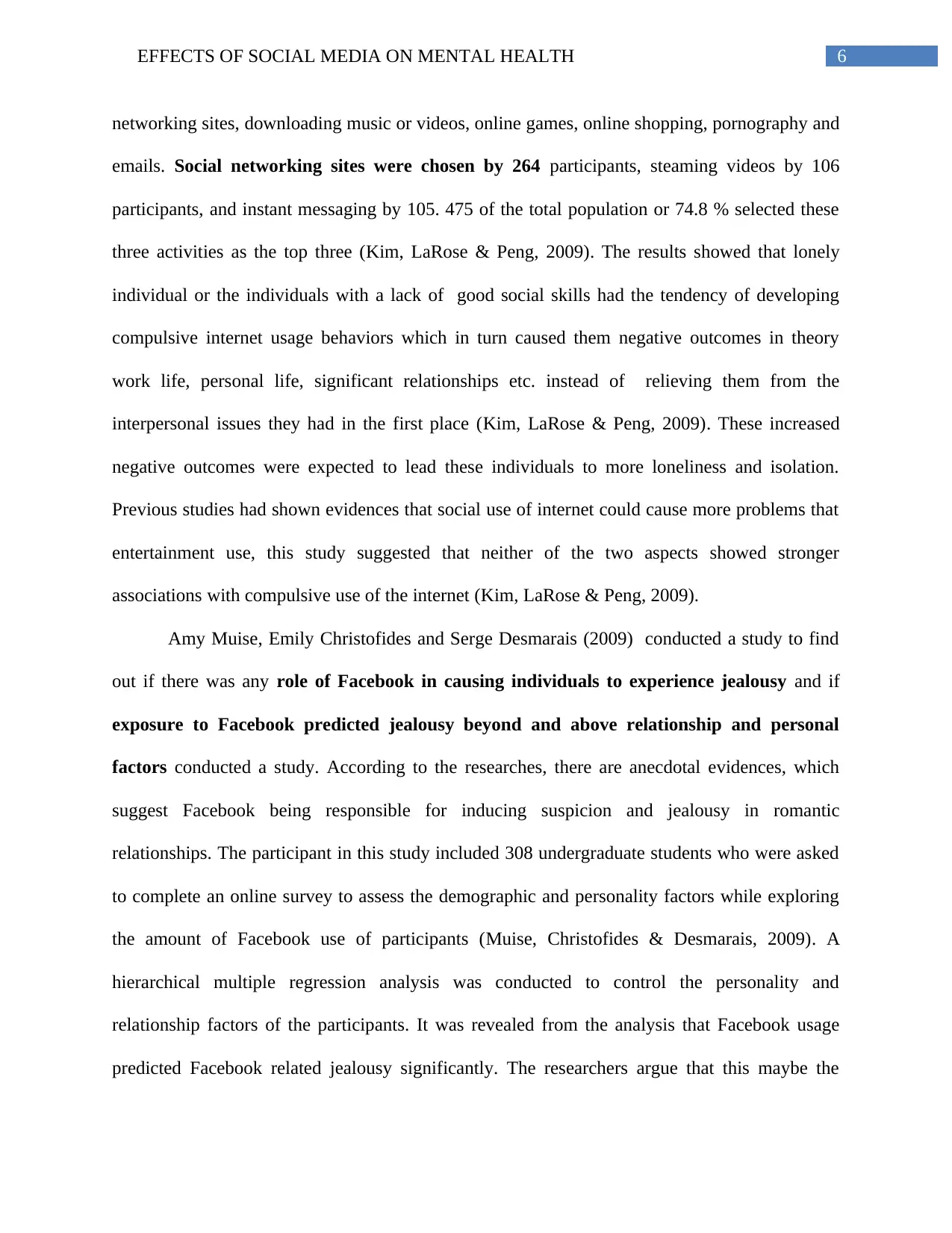
6EFFECTS OF SOCIAL MEDIA ON MENTAL HEALTH
networking sites, downloading music or videos, online games, online shopping, pornography and
emails. Social networking sites were chosen by 264 participants, steaming videos by 106
participants, and instant messaging by 105. 475 of the total population or 74.8 % selected these
three activities as the top three (Kim, LaRose & Peng, 2009). The results showed that lonely
individual or the individuals with a lack of good social skills had the tendency of developing
compulsive internet usage behaviors which in turn caused them negative outcomes in theory
work life, personal life, significant relationships etc. instead of relieving them from the
interpersonal issues they had in the first place (Kim, LaRose & Peng, 2009). These increased
negative outcomes were expected to lead these individuals to more loneliness and isolation.
Previous studies had shown evidences that social use of internet could cause more problems that
entertainment use, this study suggested that neither of the two aspects showed stronger
associations with compulsive use of the internet (Kim, LaRose & Peng, 2009).
Amy Muise, Emily Christofides and Serge Desmarais (2009) conducted a study to find
out if there was any role of Facebook in causing individuals to experience jealousy and if
exposure to Facebook predicted jealousy beyond and above relationship and personal
factors conducted a study. According to the researches, there are anecdotal evidences, which
suggest Facebook being responsible for inducing suspicion and jealousy in romantic
relationships. The participant in this study included 308 undergraduate students who were asked
to complete an online survey to assess the demographic and personality factors while exploring
the amount of Facebook use of participants (Muise, Christofides & Desmarais, 2009). A
hierarchical multiple regression analysis was conducted to control the personality and
relationship factors of the participants. It was revealed from the analysis that Facebook usage
predicted Facebook related jealousy significantly. The researchers argue that this maybe the
networking sites, downloading music or videos, online games, online shopping, pornography and
emails. Social networking sites were chosen by 264 participants, steaming videos by 106
participants, and instant messaging by 105. 475 of the total population or 74.8 % selected these
three activities as the top three (Kim, LaRose & Peng, 2009). The results showed that lonely
individual or the individuals with a lack of good social skills had the tendency of developing
compulsive internet usage behaviors which in turn caused them negative outcomes in theory
work life, personal life, significant relationships etc. instead of relieving them from the
interpersonal issues they had in the first place (Kim, LaRose & Peng, 2009). These increased
negative outcomes were expected to lead these individuals to more loneliness and isolation.
Previous studies had shown evidences that social use of internet could cause more problems that
entertainment use, this study suggested that neither of the two aspects showed stronger
associations with compulsive use of the internet (Kim, LaRose & Peng, 2009).
Amy Muise, Emily Christofides and Serge Desmarais (2009) conducted a study to find
out if there was any role of Facebook in causing individuals to experience jealousy and if
exposure to Facebook predicted jealousy beyond and above relationship and personal
factors conducted a study. According to the researches, there are anecdotal evidences, which
suggest Facebook being responsible for inducing suspicion and jealousy in romantic
relationships. The participant in this study included 308 undergraduate students who were asked
to complete an online survey to assess the demographic and personality factors while exploring
the amount of Facebook use of participants (Muise, Christofides & Desmarais, 2009). A
hierarchical multiple regression analysis was conducted to control the personality and
relationship factors of the participants. It was revealed from the analysis that Facebook usage
predicted Facebook related jealousy significantly. The researchers argue that this maybe the
⊘ This is a preview!⊘
Do you want full access?
Subscribe today to unlock all pages.

Trusted by 1+ million students worldwide
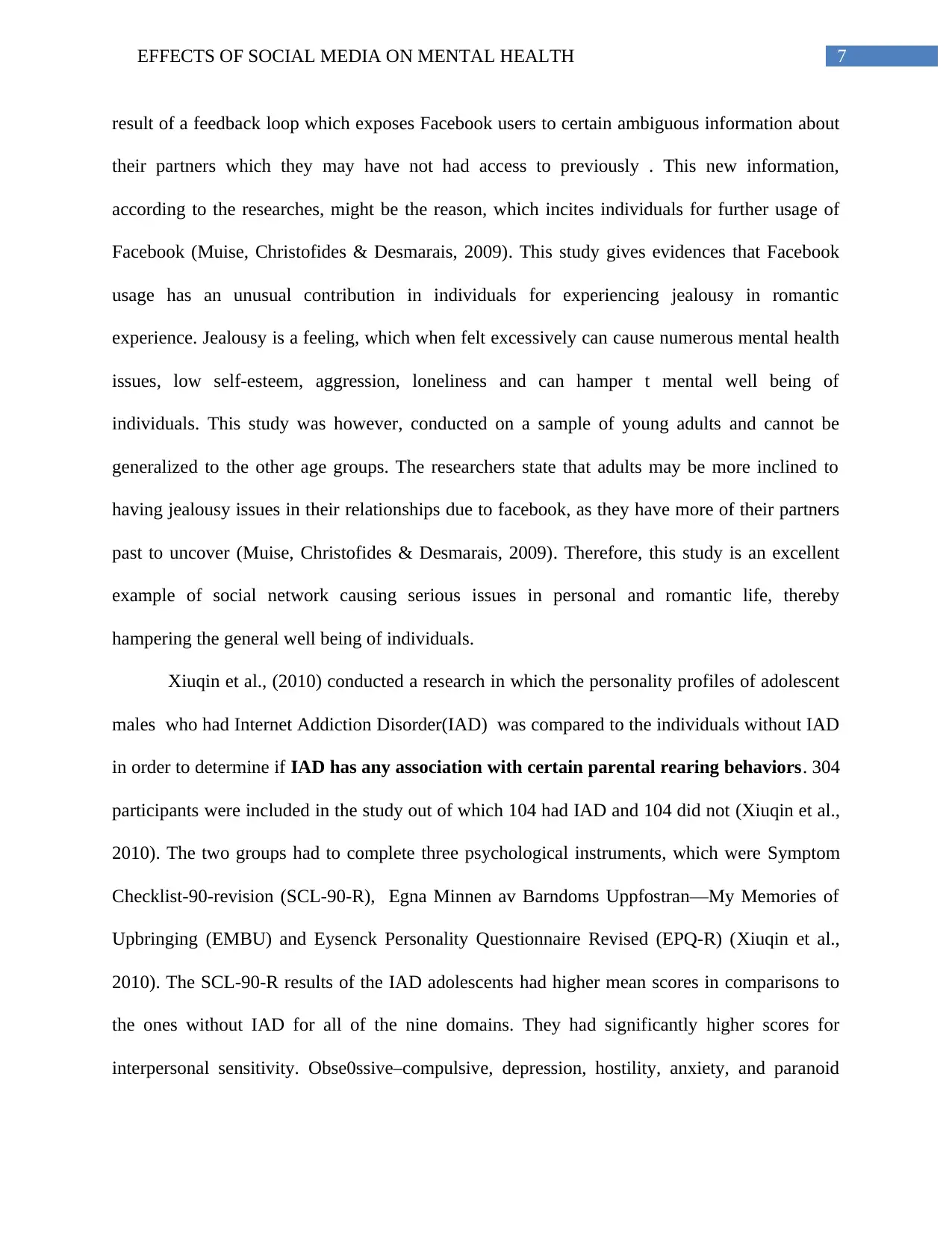
7EFFECTS OF SOCIAL MEDIA ON MENTAL HEALTH
result of a feedback loop which exposes Facebook users to certain ambiguous information about
their partners which they may have not had access to previously . This new information,
according to the researches, might be the reason, which incites individuals for further usage of
Facebook (Muise, Christofides & Desmarais, 2009). This study gives evidences that Facebook
usage has an unusual contribution in individuals for experiencing jealousy in romantic
experience. Jealousy is a feeling, which when felt excessively can cause numerous mental health
issues, low self-esteem, aggression, loneliness and can hamper t mental well being of
individuals. This study was however, conducted on a sample of young adults and cannot be
generalized to the other age groups. The researchers state that adults may be more inclined to
having jealousy issues in their relationships due to facebook, as they have more of their partners
past to uncover (Muise, Christofides & Desmarais, 2009). Therefore, this study is an excellent
example of social network causing serious issues in personal and romantic life, thereby
hampering the general well being of individuals.
Xiuqin et al., (2010) conducted a research in which the personality profiles of adolescent
males who had Internet Addiction Disorder(IAD) was compared to the individuals without IAD
in order to determine if IAD has any association with certain parental rearing behaviors. 304
participants were included in the study out of which 104 had IAD and 104 did not (Xiuqin et al.,
2010). The two groups had to complete three psychological instruments, which were Symptom
Checklist-90-revision (SCL-90-R), Egna Minnen av Barndoms Uppfostran—My Memories of
Upbringing (EMBU) and Eysenck Personality Questionnaire Revised (EPQ-R) (Xiuqin et al.,
2010). The SCL-90-R results of the IAD adolescents had higher mean scores in comparisons to
the ones without IAD for all of the nine domains. They had significantly higher scores for
interpersonal sensitivity. Obse0ssive–compulsive, depression, hostility, anxiety, and paranoid
result of a feedback loop which exposes Facebook users to certain ambiguous information about
their partners which they may have not had access to previously . This new information,
according to the researches, might be the reason, which incites individuals for further usage of
Facebook (Muise, Christofides & Desmarais, 2009). This study gives evidences that Facebook
usage has an unusual contribution in individuals for experiencing jealousy in romantic
experience. Jealousy is a feeling, which when felt excessively can cause numerous mental health
issues, low self-esteem, aggression, loneliness and can hamper t mental well being of
individuals. This study was however, conducted on a sample of young adults and cannot be
generalized to the other age groups. The researchers state that adults may be more inclined to
having jealousy issues in their relationships due to facebook, as they have more of their partners
past to uncover (Muise, Christofides & Desmarais, 2009). Therefore, this study is an excellent
example of social network causing serious issues in personal and romantic life, thereby
hampering the general well being of individuals.
Xiuqin et al., (2010) conducted a research in which the personality profiles of adolescent
males who had Internet Addiction Disorder(IAD) was compared to the individuals without IAD
in order to determine if IAD has any association with certain parental rearing behaviors. 304
participants were included in the study out of which 104 had IAD and 104 did not (Xiuqin et al.,
2010). The two groups had to complete three psychological instruments, which were Symptom
Checklist-90-revision (SCL-90-R), Egna Minnen av Barndoms Uppfostran—My Memories of
Upbringing (EMBU) and Eysenck Personality Questionnaire Revised (EPQ-R) (Xiuqin et al.,
2010). The SCL-90-R results of the IAD adolescents had higher mean scores in comparisons to
the ones without IAD for all of the nine domains. They had significantly higher scores for
interpersonal sensitivity. Obse0ssive–compulsive, depression, hostility, anxiety, and paranoid
Paraphrase This Document
Need a fresh take? Get an instant paraphrase of this document with our AI Paraphraser
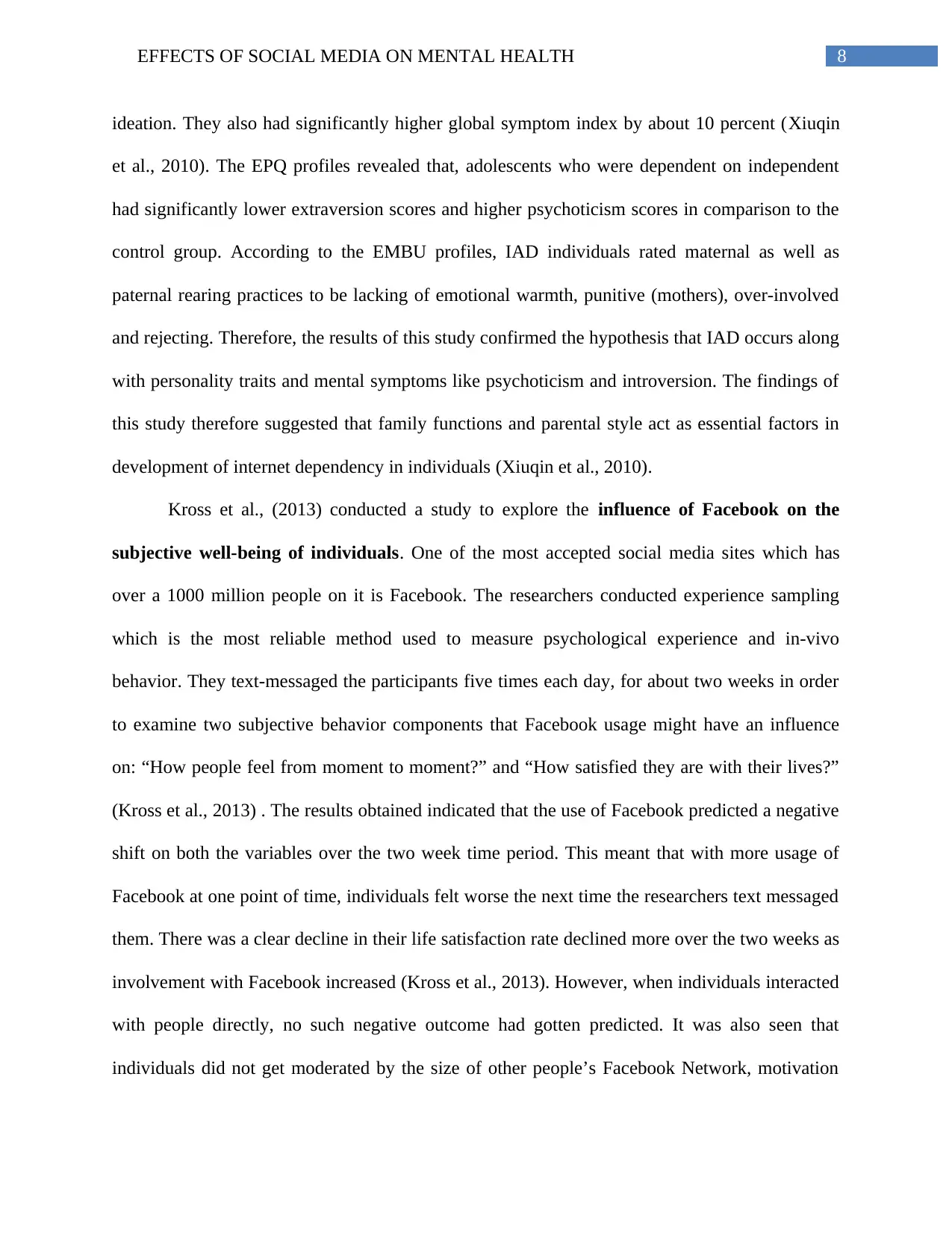
8EFFECTS OF SOCIAL MEDIA ON MENTAL HEALTH
ideation. They also had significantly higher global symptom index by about 10 percent (Xiuqin
et al., 2010). The EPQ profiles revealed that, adolescents who were dependent on independent
had significantly lower extraversion scores and higher psychoticism scores in comparison to the
control group. According to the EMBU profiles, IAD individuals rated maternal as well as
paternal rearing practices to be lacking of emotional warmth, punitive (mothers), over-involved
and rejecting. Therefore, the results of this study confirmed the hypothesis that IAD occurs along
with personality traits and mental symptoms like psychoticism and introversion. The findings of
this study therefore suggested that family functions and parental style act as essential factors in
development of internet dependency in individuals (Xiuqin et al., 2010).
Kross et al., (2013) conducted a study to explore the influence of Facebook on the
subjective well-being of individuals. One of the most accepted social media sites which has
over a 1000 million people on it is Facebook. The researchers conducted experience sampling
which is the most reliable method used to measure psychological experience and in-vivo
behavior. They text-messaged the participants five times each day, for about two weeks in order
to examine two subjective behavior components that Facebook usage might have an influence
on: “How people feel from moment to moment?” and “How satisfied they are with their lives?”
(Kross et al., 2013) . The results obtained indicated that the use of Facebook predicted a negative
shift on both the variables over the two week time period. This meant that with more usage of
Facebook at one point of time, individuals felt worse the next time the researchers text messaged
them. There was a clear decline in their life satisfaction rate declined more over the two weeks as
involvement with Facebook increased (Kross et al., 2013). However, when individuals interacted
with people directly, no such negative outcome had gotten predicted. It was also seen that
individuals did not get moderated by the size of other people’s Facebook Network, motivation
ideation. They also had significantly higher global symptom index by about 10 percent (Xiuqin
et al., 2010). The EPQ profiles revealed that, adolescents who were dependent on independent
had significantly lower extraversion scores and higher psychoticism scores in comparison to the
control group. According to the EMBU profiles, IAD individuals rated maternal as well as
paternal rearing practices to be lacking of emotional warmth, punitive (mothers), over-involved
and rejecting. Therefore, the results of this study confirmed the hypothesis that IAD occurs along
with personality traits and mental symptoms like psychoticism and introversion. The findings of
this study therefore suggested that family functions and parental style act as essential factors in
development of internet dependency in individuals (Xiuqin et al., 2010).
Kross et al., (2013) conducted a study to explore the influence of Facebook on the
subjective well-being of individuals. One of the most accepted social media sites which has
over a 1000 million people on it is Facebook. The researchers conducted experience sampling
which is the most reliable method used to measure psychological experience and in-vivo
behavior. They text-messaged the participants five times each day, for about two weeks in order
to examine two subjective behavior components that Facebook usage might have an influence
on: “How people feel from moment to moment?” and “How satisfied they are with their lives?”
(Kross et al., 2013) . The results obtained indicated that the use of Facebook predicted a negative
shift on both the variables over the two week time period. This meant that with more usage of
Facebook at one point of time, individuals felt worse the next time the researchers text messaged
them. There was a clear decline in their life satisfaction rate declined more over the two weeks as
involvement with Facebook increased (Kross et al., 2013). However, when individuals interacted
with people directly, no such negative outcome had gotten predicted. It was also seen that
individuals did not get moderated by the size of other people’s Facebook Network, motivation
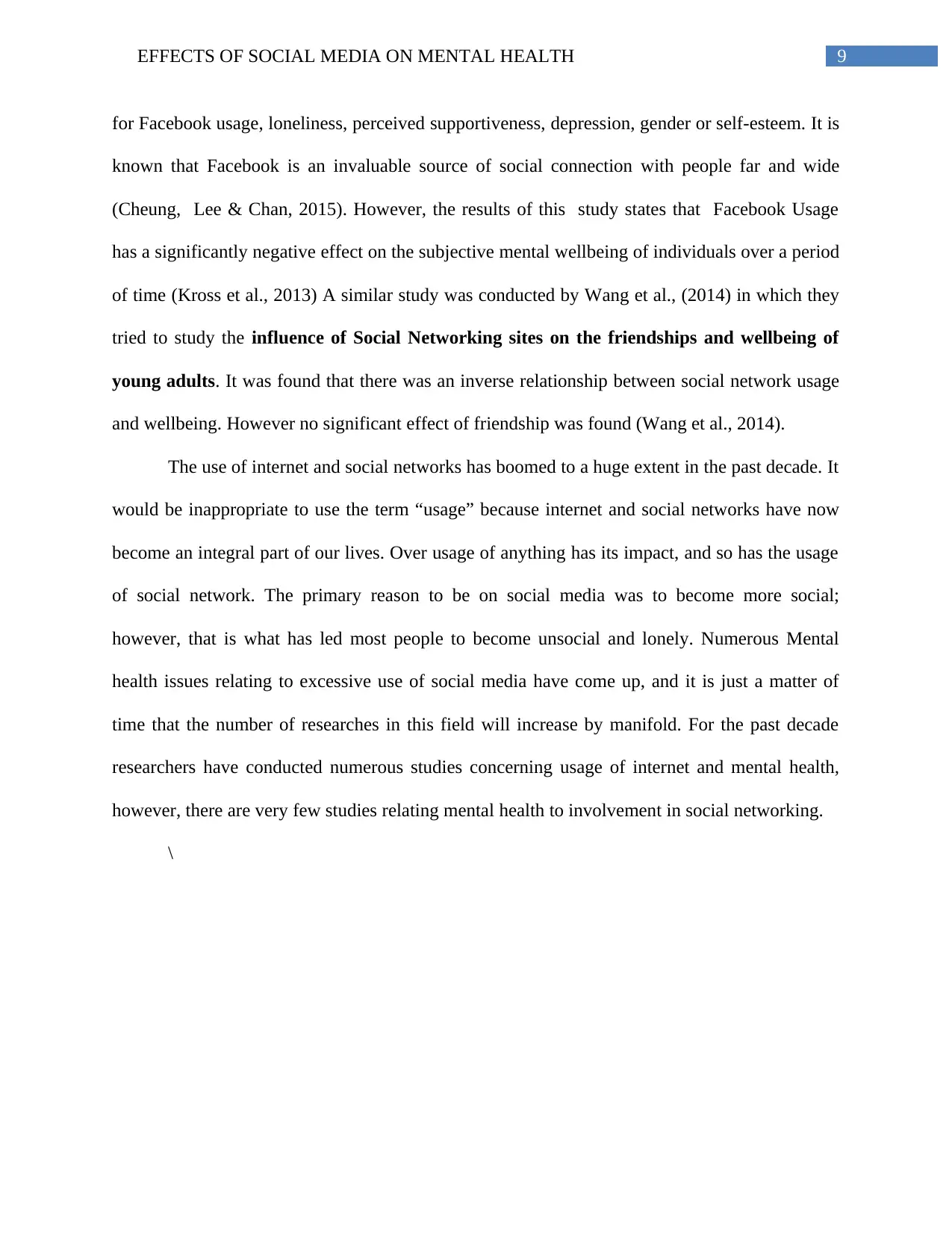
9EFFECTS OF SOCIAL MEDIA ON MENTAL HEALTH
for Facebook usage, loneliness, perceived supportiveness, depression, gender or self-esteem. It is
known that Facebook is an invaluable source of social connection with people far and wide
(Cheung, Lee & Chan, 2015). However, the results of this study states that Facebook Usage
has a significantly negative effect on the subjective mental wellbeing of individuals over a period
of time (Kross et al., 2013) A similar study was conducted by Wang et al., (2014) in which they
tried to study the influence of Social Networking sites on the friendships and wellbeing of
young adults. It was found that there was an inverse relationship between social network usage
and wellbeing. However no significant effect of friendship was found (Wang et al., 2014).
The use of internet and social networks has boomed to a huge extent in the past decade. It
would be inappropriate to use the term “usage” because internet and social networks have now
become an integral part of our lives. Over usage of anything has its impact, and so has the usage
of social network. The primary reason to be on social media was to become more social;
however, that is what has led most people to become unsocial and lonely. Numerous Mental
health issues relating to excessive use of social media have come up, and it is just a matter of
time that the number of researches in this field will increase by manifold. For the past decade
researchers have conducted numerous studies concerning usage of internet and mental health,
however, there are very few studies relating mental health to involvement in social networking.
\
for Facebook usage, loneliness, perceived supportiveness, depression, gender or self-esteem. It is
known that Facebook is an invaluable source of social connection with people far and wide
(Cheung, Lee & Chan, 2015). However, the results of this study states that Facebook Usage
has a significantly negative effect on the subjective mental wellbeing of individuals over a period
of time (Kross et al., 2013) A similar study was conducted by Wang et al., (2014) in which they
tried to study the influence of Social Networking sites on the friendships and wellbeing of
young adults. It was found that there was an inverse relationship between social network usage
and wellbeing. However no significant effect of friendship was found (Wang et al., 2014).
The use of internet and social networks has boomed to a huge extent in the past decade. It
would be inappropriate to use the term “usage” because internet and social networks have now
become an integral part of our lives. Over usage of anything has its impact, and so has the usage
of social network. The primary reason to be on social media was to become more social;
however, that is what has led most people to become unsocial and lonely. Numerous Mental
health issues relating to excessive use of social media have come up, and it is just a matter of
time that the number of researches in this field will increase by manifold. For the past decade
researchers have conducted numerous studies concerning usage of internet and mental health,
however, there are very few studies relating mental health to involvement in social networking.
\
⊘ This is a preview!⊘
Do you want full access?
Subscribe today to unlock all pages.

Trusted by 1+ million students worldwide
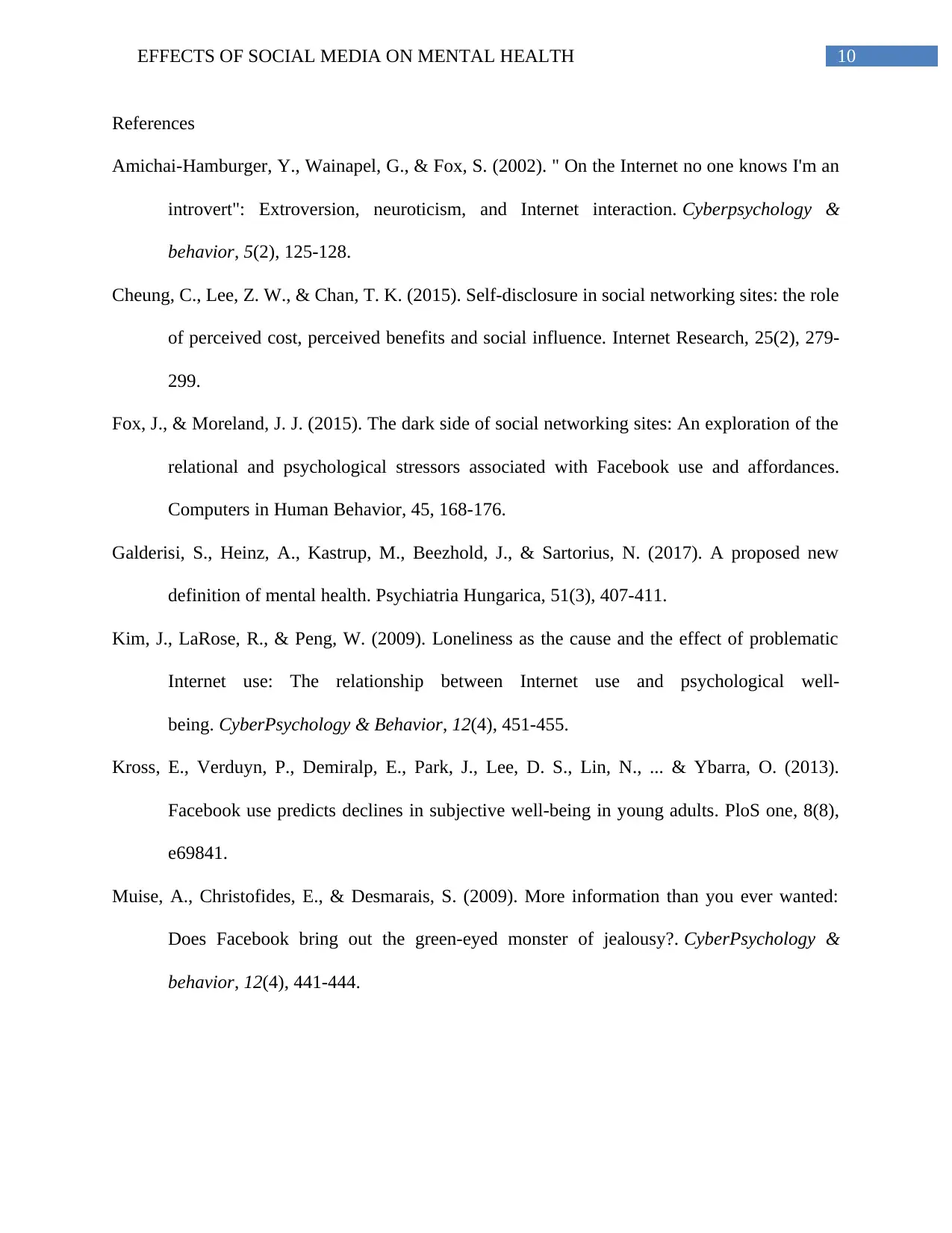
10EFFECTS OF SOCIAL MEDIA ON MENTAL HEALTH
References
Amichai-Hamburger, Y., Wainapel, G., & Fox, S. (2002). " On the Internet no one knows I'm an
introvert": Extroversion, neuroticism, and Internet interaction. Cyberpsychology &
behavior, 5(2), 125-128.
Cheung, C., Lee, Z. W., & Chan, T. K. (2015). Self-disclosure in social networking sites: the role
of perceived cost, perceived benefits and social influence. Internet Research, 25(2), 279-
299.
Fox, J., & Moreland, J. J. (2015). The dark side of social networking sites: An exploration of the
relational and psychological stressors associated with Facebook use and affordances.
Computers in Human Behavior, 45, 168-176.
Galderisi, S., Heinz, A., Kastrup, M., Beezhold, J., & Sartorius, N. (2017). A proposed new
definition of mental health. Psychiatria Hungarica, 51(3), 407-411.
Kim, J., LaRose, R., & Peng, W. (2009). Loneliness as the cause and the effect of problematic
Internet use: The relationship between Internet use and psychological well-
being. CyberPsychology & Behavior, 12(4), 451-455.
Kross, E., Verduyn, P., Demiralp, E., Park, J., Lee, D. S., Lin, N., ... & Ybarra, O. (2013).
Facebook use predicts declines in subjective well-being in young adults. PloS one, 8(8),
e69841.
Muise, A., Christofides, E., & Desmarais, S. (2009). More information than you ever wanted:
Does Facebook bring out the green-eyed monster of jealousy?. CyberPsychology &
behavior, 12(4), 441-444.
References
Amichai-Hamburger, Y., Wainapel, G., & Fox, S. (2002). " On the Internet no one knows I'm an
introvert": Extroversion, neuroticism, and Internet interaction. Cyberpsychology &
behavior, 5(2), 125-128.
Cheung, C., Lee, Z. W., & Chan, T. K. (2015). Self-disclosure in social networking sites: the role
of perceived cost, perceived benefits and social influence. Internet Research, 25(2), 279-
299.
Fox, J., & Moreland, J. J. (2015). The dark side of social networking sites: An exploration of the
relational and psychological stressors associated with Facebook use and affordances.
Computers in Human Behavior, 45, 168-176.
Galderisi, S., Heinz, A., Kastrup, M., Beezhold, J., & Sartorius, N. (2017). A proposed new
definition of mental health. Psychiatria Hungarica, 51(3), 407-411.
Kim, J., LaRose, R., & Peng, W. (2009). Loneliness as the cause and the effect of problematic
Internet use: The relationship between Internet use and psychological well-
being. CyberPsychology & Behavior, 12(4), 451-455.
Kross, E., Verduyn, P., Demiralp, E., Park, J., Lee, D. S., Lin, N., ... & Ybarra, O. (2013).
Facebook use predicts declines in subjective well-being in young adults. PloS one, 8(8),
e69841.
Muise, A., Christofides, E., & Desmarais, S. (2009). More information than you ever wanted:
Does Facebook bring out the green-eyed monster of jealousy?. CyberPsychology &
behavior, 12(4), 441-444.
Paraphrase This Document
Need a fresh take? Get an instant paraphrase of this document with our AI Paraphraser
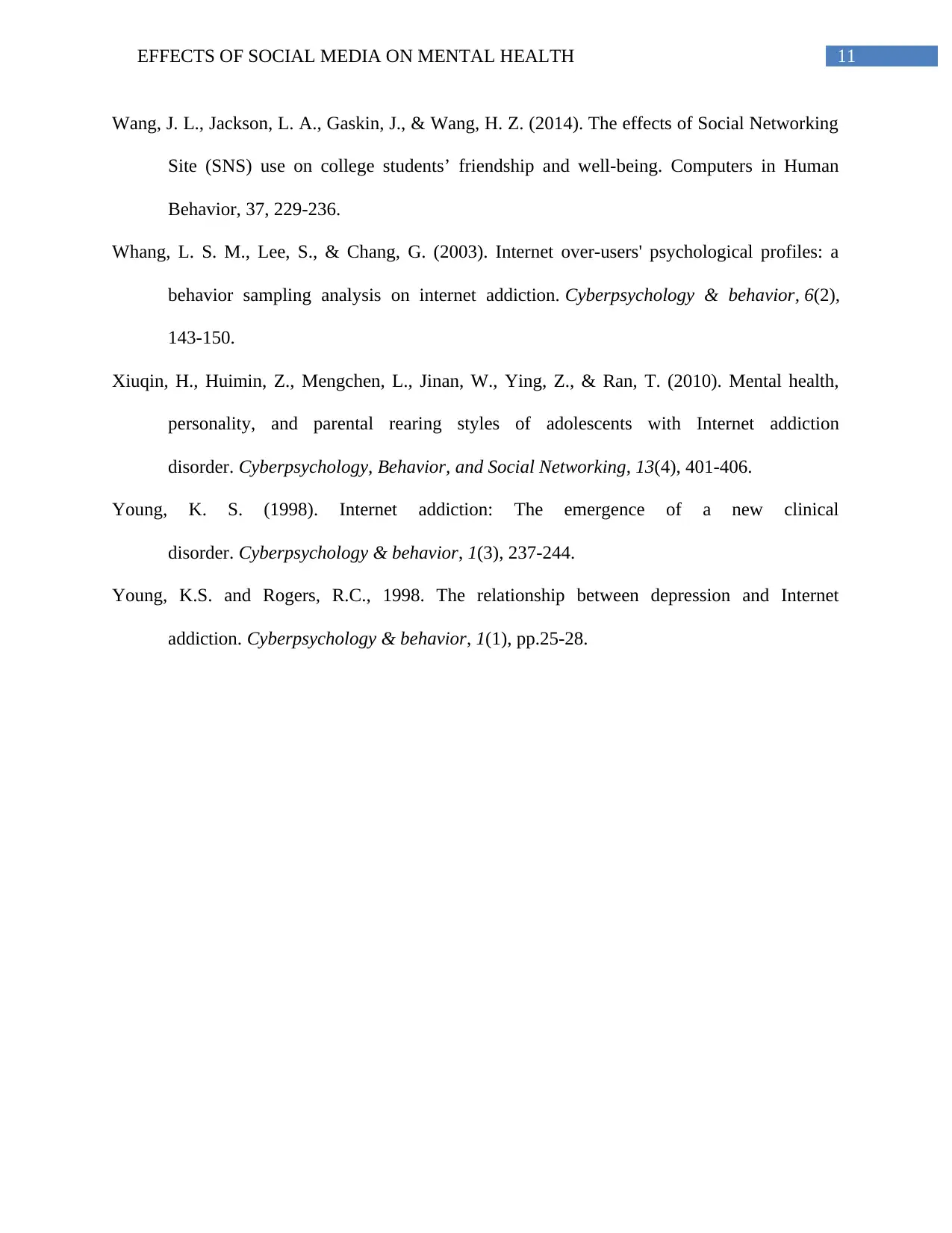
11EFFECTS OF SOCIAL MEDIA ON MENTAL HEALTH
Wang, J. L., Jackson, L. A., Gaskin, J., & Wang, H. Z. (2014). The effects of Social Networking
Site (SNS) use on college students’ friendship and well-being. Computers in Human
Behavior, 37, 229-236.
Whang, L. S. M., Lee, S., & Chang, G. (2003). Internet over-users' psychological profiles: a
behavior sampling analysis on internet addiction. Cyberpsychology & behavior, 6(2),
143-150.
Xiuqin, H., Huimin, Z., Mengchen, L., Jinan, W., Ying, Z., & Ran, T. (2010). Mental health,
personality, and parental rearing styles of adolescents with Internet addiction
disorder. Cyberpsychology, Behavior, and Social Networking, 13(4), 401-406.
Young, K. S. (1998). Internet addiction: The emergence of a new clinical
disorder. Cyberpsychology & behavior, 1(3), 237-244.
Young, K.S. and Rogers, R.C., 1998. The relationship between depression and Internet
addiction. Cyberpsychology & behavior, 1(1), pp.25-28.
Wang, J. L., Jackson, L. A., Gaskin, J., & Wang, H. Z. (2014). The effects of Social Networking
Site (SNS) use on college students’ friendship and well-being. Computers in Human
Behavior, 37, 229-236.
Whang, L. S. M., Lee, S., & Chang, G. (2003). Internet over-users' psychological profiles: a
behavior sampling analysis on internet addiction. Cyberpsychology & behavior, 6(2),
143-150.
Xiuqin, H., Huimin, Z., Mengchen, L., Jinan, W., Ying, Z., & Ran, T. (2010). Mental health,
personality, and parental rearing styles of adolescents with Internet addiction
disorder. Cyberpsychology, Behavior, and Social Networking, 13(4), 401-406.
Young, K. S. (1998). Internet addiction: The emergence of a new clinical
disorder. Cyberpsychology & behavior, 1(3), 237-244.
Young, K.S. and Rogers, R.C., 1998. The relationship between depression and Internet
addiction. Cyberpsychology & behavior, 1(1), pp.25-28.
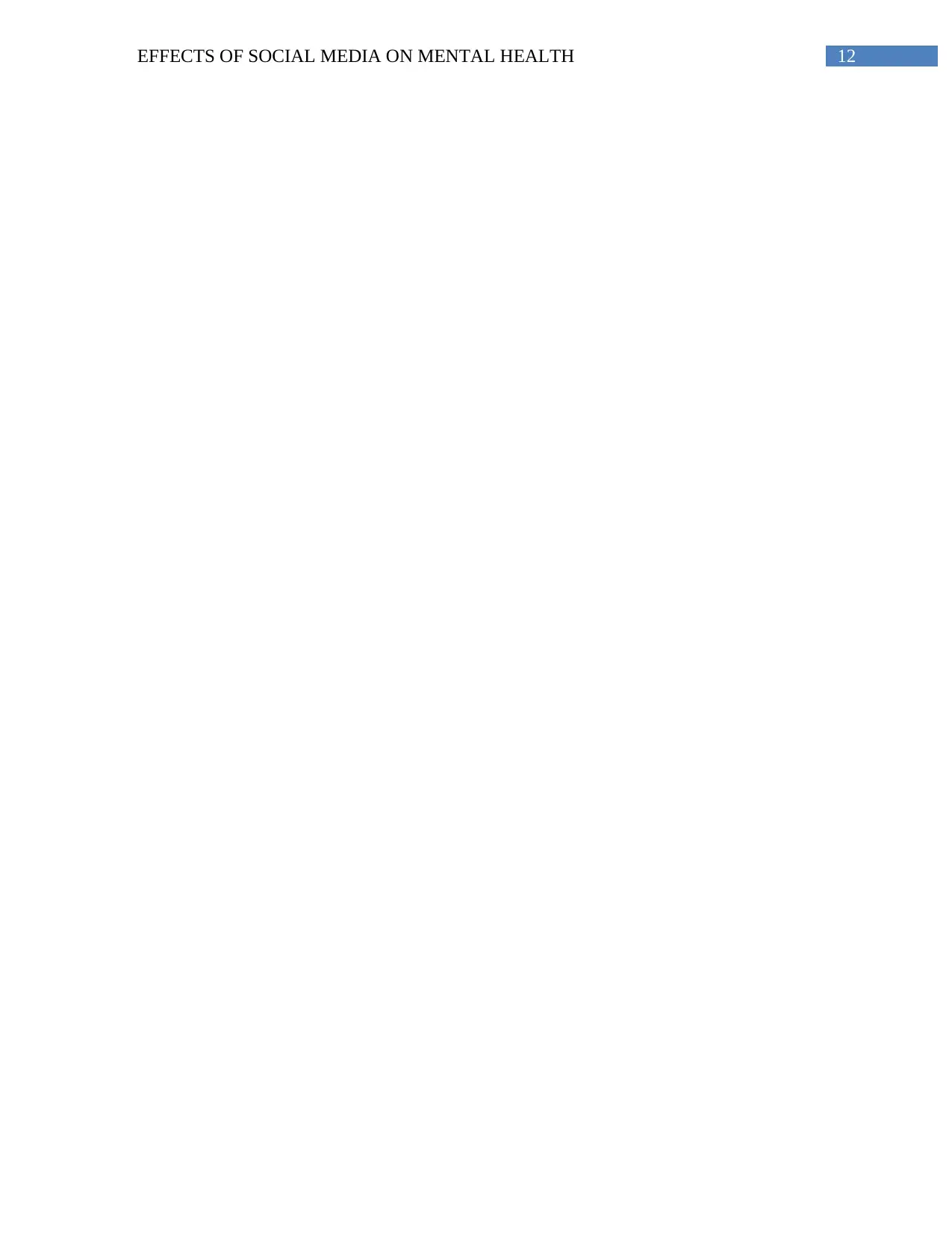
12EFFECTS OF SOCIAL MEDIA ON MENTAL HEALTH
⊘ This is a preview!⊘
Do you want full access?
Subscribe today to unlock all pages.

Trusted by 1+ million students worldwide
1 out of 12
Related Documents
Your All-in-One AI-Powered Toolkit for Academic Success.
+13062052269
info@desklib.com
Available 24*7 on WhatsApp / Email
![[object Object]](/_next/static/media/star-bottom.7253800d.svg)
Unlock your academic potential
Copyright © 2020–2026 A2Z Services. All Rights Reserved. Developed and managed by ZUCOL.





